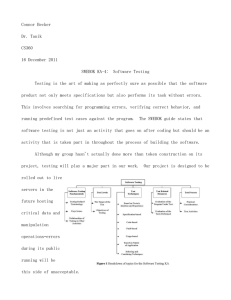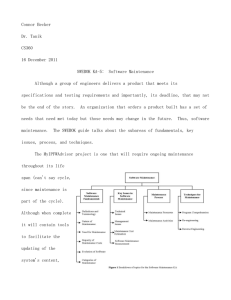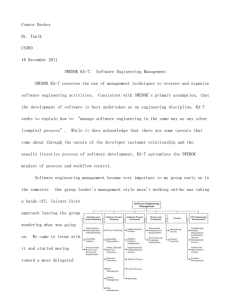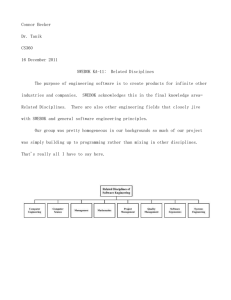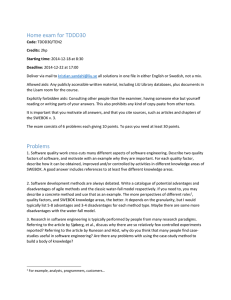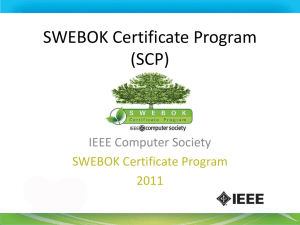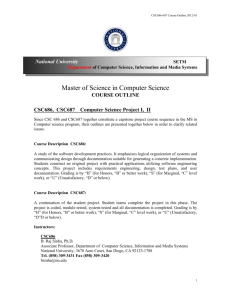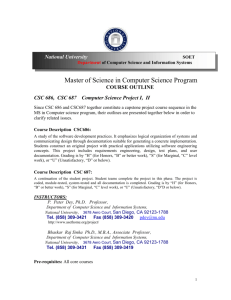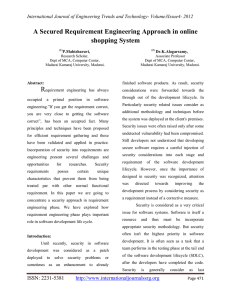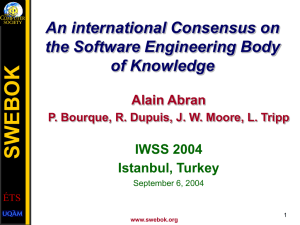TDDD30 - Advanced Software Engineering Course introduction Kristian Sandahl
advertisement
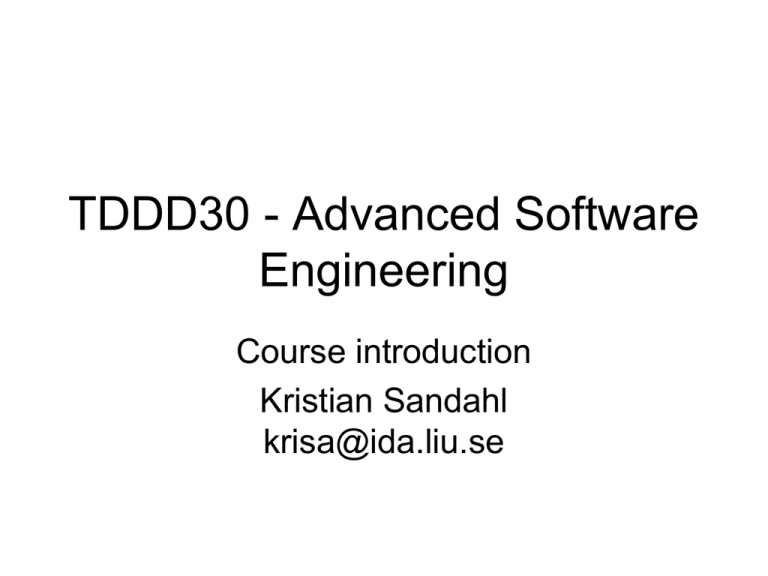
TDDD30 - Advanced Software Engineering Course introduction Kristian Sandahl krisa@ida.liu.se Goal of the course • Get a more complete picture of Software Engineering • Learn how to take advantage of published material • Practice publishing techniques Course activities • A quick walk-through of: Guide to SWEBOK v 3 • Lectures on fundamental parts of special topics • Seminars • Group work: Prepare presentation of one article or investigation • Individual term-paper Guide to SWEBOK • A result of an IEEE CS project of 2004, now in version 3 • Guide to the core knowledge • Don’t mix the guide to SWEBOK with SWEBOK itself • Organised in (overlapping) knowledge areas with references Specialised for certain types of software Categories of knowledge Generally accepted knowledge -Established -Traditional -Recommended by many Advanced and research -Innovative -Tested in research -Tested by few Lectures • Doman-Specifc Languages example: Modelica • Model-checking • Requirements validation • Software metrics and exeperiments Seminars • Experiences from standard ISO/IEC/IEEE 15288:2015 for Systems and Software Engineering – System Life Cycle Process. • A practical workshop about creating System Anatomies • Students’ seminars Topic of student seminar • Result from your own experiment • Result from using publicly available data, for instance, http://openscience.us/repo/ • A published Systematic Literature Review. Finding articles • • • • • • • • http://guide.bibl.liu.se/datavetenskap Books24x7 IEEE Xplore ScienceDirekt - Elsevier Scopus SpringerLink - Computer Science Web of Science Google books Wikipedia? Reading a research paper • • • • • • • • • What is the problem and contribution? What is the support for the claims? Create initial mind-map or similar Think of what you know, would like to know. Set your expectations for the paper. Read again, fill in mind-maps, notice what is not covered in the paper Raise questions Read to eliminate questions Browse references, consult other material to eliminate questions Judgement: – – – – Is there enough information in the paper to understand it? Is there superfluous information? Is the paper easy to understand? Quality of layout and language? Writing a term paper • Select an interesting topic within SWEBOK • Always write a synopsis: – – – – – – Why do you write the paper? Who are intended readers? What will the readers learn? What are your main argumentation and conclusion? What are your major sources? If applicable: overlap with other courses. • Collect details: – Mind-map, notes, stickers, cards, etc… • Send me a mail about the title and main idea • Write a first draft top-down • Go through the text in detail Introduction • Situation • Complication • Approach • The reader should be tempted to continue reading • No definite results in introduction Contribution • Your topic: findings, backing, main argumentation. References needed. • Discussion: Is this good? Are there surprises? Are there alternatives? What would have been interesting? Can be more freely formulated • Conclusion: Short and safe! References • • • • Find your own standard, eg IEEE Software All references at the end Web references shall have access-date Web references shall not outnumber the published references • Better a published paper than 10 blogs • Use footnotes sparingly Quotations • Clearly marked: – Citation marks – Indented – Different font – Source • Less than 10% of the number of lines Plagiarism • Serious problem • Temptation, mistake • http://noplagiat.bibl.liu.se/ Hints • Have a friend read your text • Save practical work with figures and references, do this when you are tired • You can write in 1st person, present tense Passed term paper • • • • 10-line abstracts with major results 2-3 good references Understandable English About 4 pages excluding pictures and references • Typical topics: – Description of concept outside the basic course – Comparison between two approaches – Case study description Level 4 term paper • • • • 10-line abstracts with major results 10 good references Good, fault-free English 4-8 pages excluding pictures and references • Typical topics: – Survey of related concepts – Larger introduction to a field – Book reviews Level 5 term paper • • • • • • • • • 10-line abstracts with major results At least10 good references Good, fault-free English Own contribution explicitly formulated Research question formulated Research method described and discussed Own findings described, and compared to literature 4-10 pages excluding pictures and references Typical topics: – – – – Thesis proposal Pedagogic material Experiment report Novel models Conceptual map Grade 5 Own, small contribution Grade 4 Better writing More material Grade 3 Written exam • Topic: SWEBOK, lectures, seminars (exkl. 15288) • Scheduled for 2016-01-11 • Hall or at home? Practical things • Divide yourself in groups of 2-3 students. • For each group: send me a mail of members, and your ideas of a seminar • For each person: think about the topic of a term paper. Write a synopsis and send to me.
